人教新目标版2019中考英语八上Unit1Wheredidyougoonvacation阅读练习及答案
八年级英语上册Unit1Wheredidyougoonvacation讲义+习题(新版)人教新目标版
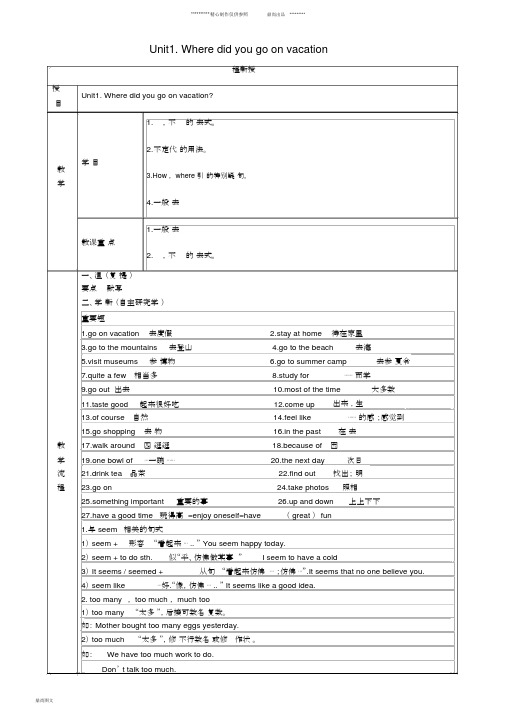
Unit1. Where did you go on vacation程新授授Unit1. Where did you go on vacation?目1.,不的去式。
2.不定代的用法。
学目教3.How , where 引的特别疑句。
学4.一般去1.一般去教课重点2.,不的去式。
一、温(复提)要点默写二、学新(自主研究学)重要短1.go on vacation去度假2.stay at home待在家里3.go to the mountains去登山4.go to the beach去海5.visit museums参博物6.go to summer camp去参夏令7.quite a few相当多8.study for⋯⋯ 而学9.go out 出去10.most of the time大多数11.taste good起来很好吃e up出来 ,生13.of course自然14.feel like⋯⋯的感;感觉到15.go shopping去物16.in the past在去教17.walk around四逛逛18.because of因学19.one bowl of⋯一碗⋯⋯20.the next day次日流21.drink tea品茶22.find out找出;明程23.go on24.take photos照相25.something important重要的事26.up and down上上下下27.have a good time 玩得高 =enjoy oneself=have( great ) fun1.与 seem相关的句式1) seem +形容“看起来⋯ .. ” You seem happy today.2) seem + to do sth.似“乎、仿佛做某事”I seem to have a cold3) It seems / seemed +从句“看起来仿佛⋯;仿佛⋯”.It seems that no one believe you.4) seem like⋯好.“像,仿佛⋯ .. ” It seems like a good idea.2. too many, too much , much too1) too many“太多”,后接可数名复数。
人教新目标版八年级上册Unit1WheredidyougoonvacationSect
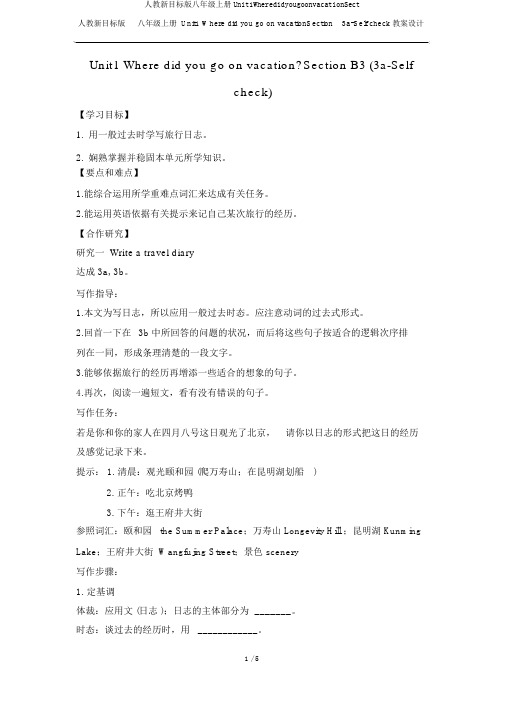
人教新目标版八年级上册 Unit1 Where did you go on vacationSection 3a-Self check 教案设计Unit1 Where did you go on vacation?Section B3 (3a-Selfcheck)【学习目标】1.用一般过去时学写旅行日志。
2.娴熟掌握并稳固本单元所学知识。
【要点和难点】1.能综合运用所学重难点词汇来达成有关任务。
2.能运用英语依据有关提示来记自己某次旅行的经历。
【合作研究】研究一 Write a travel diary达成 3a, 3b。
写作指导:1.本文为写日志,所以应用一般过去时态。
应注意动词的过去式形式。
2.回首一下在3b 中所回答的问题的状况,而后将这些句子按适合的逻辑次序排列在一同,形成条理清楚的一段文字。
3.能够依据旅行的经历再增添一些适合的想象的句子。
4.再次,阅读一遍短文,看有没有错误的句子。
写作任务:若是你和你的家人在四月八号这日观光了北京,请你以日志的形式把这日的经历及感觉记录下来。
提示: 1. 清晨:观光颐和园 (爬万寿山;在昆明湖划船)2.正午:吃北京烤鸭3.下午:逛王府井大街参照词汇:颐和园the Summer Palace;万寿山 Longevity Hill ;昆明湖 Kunming Lake;王府井大街 Wangfujing Street;景色 scenery写作步骤:1.定基调体裁:应用文 (日志 );日志的主体部分为 _______。
时态:谈过去的经历时,用____________。
人教新目标版 八年级上册 Unit1 Where did you go on vacationSection 3a-Self check 教案设计人称:写个人经历时,用 ______人称。
2. 列纲要、写句子列纲要人物、旅行目的地及天气旅行经历 早 (3) We _________________________ 参(观了颐和园 ). 上 (4) We ____________________ 爬(万寿山 ) and_________________________________欣(赏漂亮的景色 ).(5) We ___________________________(在昆明湖划船 ).中 (6) We ______________________ (吃了一些特点食品 ) like Beijing午 duck.(7) It _______________ (美味 ).下 (8) We _________________________ 去(了王府井大街 ).午 (9) I ___________________________ (买了一些风趣的东西 ) for myfriends.感觉(10) We ___________________________________过(得很快乐 ).3. 巧连接写作的评分标准之一是文章能否连接, 所以想让文章连接的方法之一就是学会恰当地使用一些连接词。
初二英语上册(人教新目标)Unit1Wheredidyougoonvacation_知识点总结
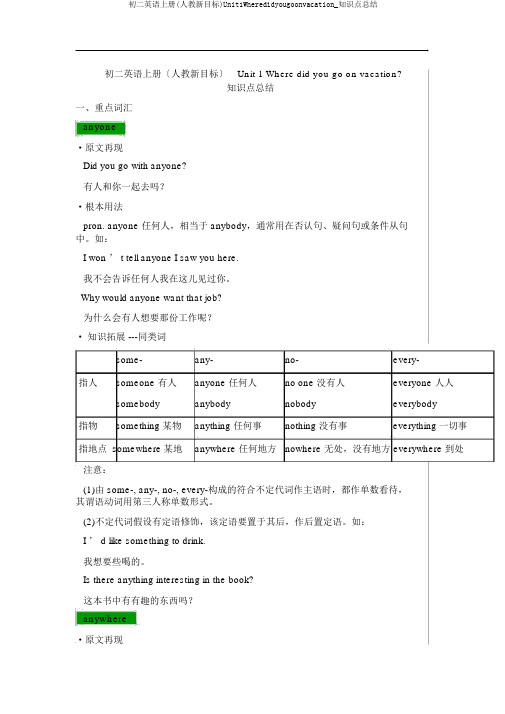
初二英语上册〔人教新目标〕Unit 1 Where did you go on vacation?知识点总结一、重点词汇anyone·原文再现Did you go with anyone?有人和你一起去吗?·根本用法pron. anyone 任何人,相当于 anybody,通常用在否认句、疑问句或条件从句中。
如:I won ’ t tell anyone I saw you here.我不会告诉任何人我在这儿见过你。
Why would anyone want that job?为什么会有人想要那份工作呢?·知识拓展 ---同类词some-any-no-every-指人someone 有人anyone 任何人no one 没有人everyone 人人somebody anybody nobody everybody指物something 某物anything 任何事nothing 没有事everything 一切事指地点 somewhere某地anywhere 任何地方nowhere 无处,没有地方 everywhere 到处注意:(1)由 some-, any-, no-, every-构成的符合不定代词作主语时,都作单数看待,其谓语动词用第三人称单数形式。
(2)不定代词假设有定语修饰,该定语要置于其后,作后置定语。
如:I ’ d like something to drink.我想要些喝的。
Is there anything interesting in the book?这本书中有有趣的东西吗?anywhere·原文再现Oh,did you go anywhere interesting?哦,你去过某个有趣的地方吗?·根本用法adv./pron. anywhere 什么地方,任何地方,常用在否认句或疑问句中。
肯定句中常用 somewhere,其修饰词也常常放在其后面。
2019年八年级英语上册Unit1Wheredidyougoonvacation知识点总结(新版)人教新目标版
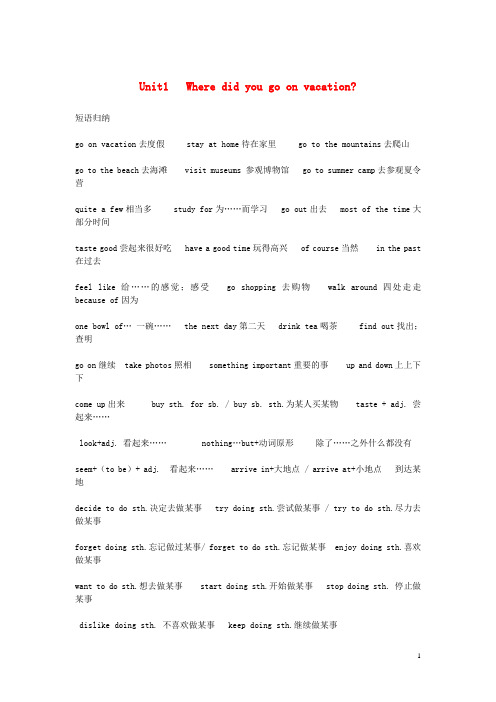
Unit1 Where did you go on vacation?短语归纳go on vacation去度假 stay at home待在家里 go to the mountains去爬山go to the beach去海滩 visit museums 参观博物馆 go to summer camp去参观夏令营quite a few相当多 study for为……而学习 go out出去 most of the time大部分时间taste good尝起来很好吃 have a good time玩得高兴 of course当然 in the past 在过去feel like给……的感觉;感受go shopping去购物walk around四处走走because of因为one bowl of…一碗…… the next day第二天 drink tea喝茶 find out找出;查明go on继续 take photos照相 something important重要的事 up and down上上下下come up出来 buy sth. for sb. / buy sb. sth.为某人买某物 taste + adj. 尝起来……look+adj. 看起来…… nothing…but+动词原形除了……之外什么都没有seem+(to be)+ adj. 看起来…… arrive in+大地点 / arrive at+小地点到达某地decide to do sth.决定去做某事 try doing sth.尝试做某事 / try to do sth.尽力去做某事forget doing sth.忘记做过某事/ forget to do sth.忘记做某事 enjoy doing sth.喜欢做某事want to do sth.想去做某事 start doing sth.开始做某事 stop doing sth. 停止做某事dislike doing sth. 不喜欢做某事 keep doing sth.继续做某事Why not do. sth.?为什么不做……呢? so+adj.+that+从句如此……以至于……tell sb. (not) to do sth. 告诉某人(不要)做某事语法讲解1. go on vacation 度假 vacation相当于holiday,但vacation表示长的假期。
人教新目标八年级英语上册Unit1Wheredidyougoonvacation知识点讲解
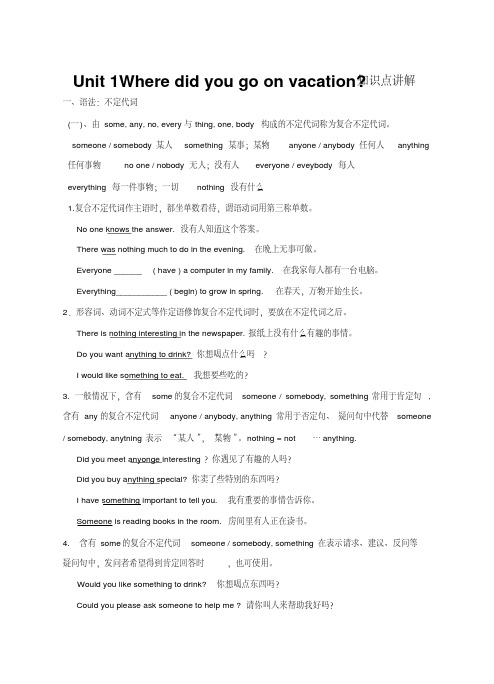
Unit 1Where did you go on vacation?知识点讲解一、语法:不定代词(一)、由some, any, no, every与thing, one, body 构成的不定代词称为复合不定代词。
someone / somebody 某人something 某事;某物anyone / anybody 任何人anything 任何事物no one / nobody 无人;没有人everyone / eveybody 每人everything 每一件事物;一切nothing 没有什么1.复合不定代词作主语时,都坐单数看待,谓语动词用第三称单数。
No one knows the answer. 没有人知道这个答案。
There was nothing much to do in the evening. 在晚上无事可做。
Everyone ______ ( have ) a computer in my family. 在我家每人都有一台电脑。
Everything___________ ( begin) to grow in spring. 在春天,万物开始生长。
2.形容词、动词不定式等作定语修饰复合不定代词时,要放在不定代词之后。
There is nothing interesting in the newspaper.报纸上没有什么有趣的事情。
Do you want anything to drink?你想喝点什么吗?I would like something to eat. 我想要些吃的?3. 一般情况下,含有some的复合不定代词someone / somebody, something常用于肯定句,含有any的复合不定代词anyone / anybody, anything常用于否定句、疑问句中代替someone / somebody, anytning表示“ 某人”,“某物”。
人教新目标版英语八上Unit1《Wheredidyougoonvacation》精美说课稿
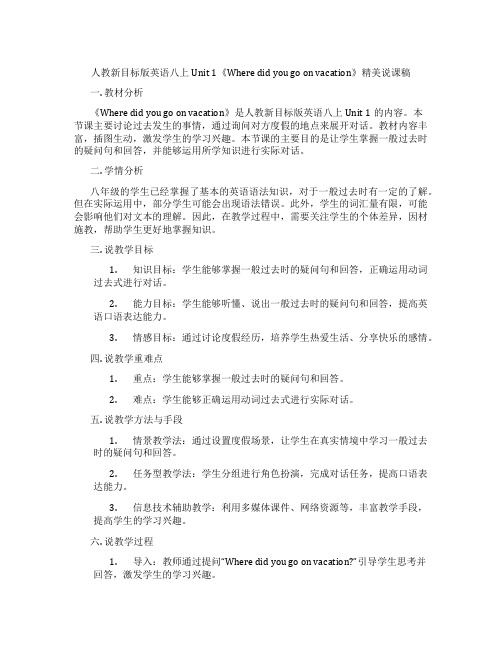
人教新目标版英语八上Unit 1《Where did you go on vacation》精美说课稿一. 教材分析《Where did you go on vacation》是人教新目标版英语八上Unit 1的内容。
本节课主要讨论过去发生的事情,通过询问对方度假的地点来展开对话。
教材内容丰富,插图生动,激发学生的学习兴趣。
本节课的主要目的是让学生掌握一般过去时的疑问句和回答,并能够运用所学知识进行实际对话。
二. 学情分析八年级的学生已经掌握了基本的英语语法知识,对于一般过去时有一定的了解。
但在实际运用中,部分学生可能会出现语法错误。
此外,学生的词汇量有限,可能会影响他们对文本的理解。
因此,在教学过程中,需要关注学生的个体差异,因材施教,帮助学生更好地掌握知识。
三. 说教学目标1.知识目标:学生能够掌握一般过去时的疑问句和回答,正确运用动词过去式进行对话。
2.能力目标:学生能够听懂、说出一般过去时的疑问句和回答,提高英语口语表达能力。
3.情感目标:通过讨论度假经历,培养学生热爱生活、分享快乐的感情。
四. 说教学重难点1.重点:学生能够掌握一般过去时的疑问句和回答。
2.难点:学生能够正确运用动词过去式进行实际对话。
五. 说教学方法与手段1.情景教学法:通过设置度假场景,让学生在真实情境中学习一般过去时的疑问句和回答。
2.任务型教学法:学生分组进行角色扮演,完成对话任务,提高口语表达能力。
3.信息技术辅助教学:利用多媒体课件、网络资源等,丰富教学手段,提高学生的学习兴趣。
六. 说教学过程1.导入:教师通过提问“Where did you go on vacation?”引导学生思考并回答,激发学生的学习兴趣。
2.新课呈现:教师展示教材插图,介绍一般过去时的疑问句和回答。
3.课堂活动:学生分组进行角色扮演,完成对话任务,教师巡回指导。
4.巩固练习:学生进行小组竞赛,看哪个小组能够在最短时间内完成一般过去时的疑问句和回答。
八年级英语上册Unit1Wheredidyougoonvacation教材详解(新版)人教新目标版

Unit 1 Where did you go on vacation?第一单元主重点:①复习一般过去时②复合不定代词的用法③反身代词的用法④系动词的用法⑤动词后的to do和doing的差异⑥e d 形容词和 ing 形容词的差异⑦“近义词”的差异⑧本单元中的主谓一致现象⑨动词过去式的组成及不规则动词表⑩用同义短语变换同义句时谓语动词形式一致性的培育。
⑾叹息句的构造和连词的选择。
一、词组、短语:1、 go on vacation 去度假2、 stay at home 呆在家,3、 go to the mountains 上山/进山4、 go to the beach 到海边去5、 visit museums 观光博物馆,6、 go to summer camp 去夏令营7、 quite a few 相当多,8、 study for 为学习,9、 go out 出去,10、 most of the time 大多半时间 / 绝大多时间,11、 taste good 尝起来滋味好,12、 have a good time 玩的高兴,13、 of course 自然能够,14、 feel like 感觉像 / 想要 ,15、 go shopping 购物,16、 in the past 在过去,17、 walk around 绕走,18、 too many 太多(可数名词前方),19、 because of 因为,20、 one bowl of 一碗 ,21、 find out 查出来/发现,22、 go on 连续,23、 take photos 照相,24、 something important 重要的事情,25、 up and down 上上下下,26、 come up 出来二、重要句子(语法):Where did you go on vacation? 你到哪里去度假了?I went to New York City. 我去了纽约城Did you go out with anyone? 你出去带人吗?No, No one was here. Everyone was on vacation. 不,没有人在这儿。
2019秋八年级英语上册Unit1Wheredidyougoonvacation教案(新版)人教新目标版

Unit 1 Where did you go on vacation?本单元教材以Where did you go on vacation?为中心话题,围绕着描述“过去发生的事情”展开,学习和运用一般过去时态的一般疑问句Did you go/see/buy...?和特殊疑问句Where/What/How...?询问过去的事件,让学生学会谈论和分享过去发生的事件。
本课教学内容与学生的实际生活密切相关,易于引发学生运用简单的英语进行交流。
在学习活动中,学生通过交换对过去发生的事情的描述及看法,促进学生之间和师生之间的情感交流,增进情谊。
Section A的主要学习内容是:复习一般过去时态和动词的规则与不规则变化,学习一般过去时态的一般疑问句:Did you...?及不定代词的用法。
Section B安排了许多听、说、读、写的任务活动,教师在教学中可以灵活运用这些活动,将其中的一些活动进行变化或整合,充分调动学生参与的积极性,提高学生的听说读写能力。
第一课时Section A(1a-2d)Teaching Goals【教学目标】Key words & phrases:anyone,anywhere,wonderful,few,most,quite a few,go on vacationKey sentences:1.Where did you go on vacation?I went to the mountains/New York City/summer camp/the beach.2.Did you...?Yes,I did./No,I didn't.Teaching Key Points【教学重点】The vocabulary:New York City,Central Park,few,most,quite a few,on vacationTarget language:Where did you/they/he/she go on vacation?I/They/He/She went to the mountains/New York City/summer camp/the beach. Did you...?Yes,I did./No,I didn't.Teaching Difficult Points【教学难点】Use the target language above to talk about past events.Teaching Aids【教学工具】An English textbook,a tape recorder,CAI or courseware.Teaching Steps【教学过程】★Step 1Leading inGreet the class and introduce what to learn in this period.Teacher:Welcome back to school!Did everyone have a good time during the summer vacation?Today we'll begin to learn the topic where you went on vacation.Teacher:Where did you go on vacation?Students:______.①I went to the mountains.②I visited museums.…★Step 2Pre-taskPage 1,1a & 1b.1.Look at the picture.2.Match each activity.3.Check the answers in 1b.4.Practice reading.Page 1,1c.1.Focus on the conversation in the box.2.Practice reading.3.Pairwork:Where did you go on vacation?I...4.Groupwork:Divide the class into groups of four or five. Make conversations.First S1 to S2:S1:Where did you go on vacation?S2:I...S1:Where did she/he go on vacation?S2:She/He...★Step 3While-taskPage 2,2a & 2b.1.Play the recording for the first time. Students complete the chart in 2a.2.Check the answers.(Point to one student who raises his or her hand.)3.Play the recording a second time and say:There are three conversations. The people talk about where they went on vacation. Listen to the recording and check(√)Yes,I did or No,I didn't for each question.4.Correct the answers.★Step 4Post-taskPage 2,2c & 2d.1.Focus on the conversation in 2c & 2d.2.Practice reading. Make students scan the conversations first.3.Teach and then make students role-play the conversation in pairs.4.Have a group of students present their conversation to the class.★Step 5Homework1.Practice the conversation on Page 2,2d.2.Do the exercises on Page 1 in students' book.Board Design板书设计Unit 1Where did you go on vacation?The first period Section A(1a-2d)1.Key vocabulary:anyone,anywhere,wonderful,quite a few,go on vacation 2.Target language:A:Where did Tina go on vacation?B:She went to the mountains.第二课时Section A(GF-3c)Teaching Goals【教学目标】Key words:something,nothing,everyone,myself,yourself,someone,seem,bored,diary Key phrases:go out,have a good time,of course,keep a diaryKey sentences:1.Where did you go on vacation?I went to New York City.2.Did you go out with anyone?Did you buy anything special?3.How was the food?How was your vacation?Teaching Key Points【教学重点】The vocabulary:something,nothing,everyone,myself,yourself,someone,seem,bored,diary,go out,have a good time,of course,keep a diary,on vacationTarget language:How was the food?Everything tasted really good!Did you go shopping?Of course!Did everyone have a good time?Oh,yes. Everything was excellent.Teaching Difficult Points【教学难点】e the target language above to talk about past events.2.The usage of someone,anyone,everyone,no one,something,anything,everything,nothing.Teaching Aids【教学工具】An English textbook,CAI or courseware.Teaching Steps【教学过程】★Step 1Leading in(T—teacher S—student)T:Where did you go last weekend?S:I went to the beach.T:Did you go there with anyone?S:Yes. I went to the beach with my brother.T:Did you have a good time there?S:...★Step 2Pre-taskPage 3,Grammar Focus.1.Review the grammar box. Work in pairs. One asks and the other answers.2.Practice reading the sentences in the chart.★Step 3While-taskPage 3,3a & 3b.1.Teach these new words:anyone,something,anything,everything,nothing,everyone,no one.2.Call students' attention to the conversation in 3a. Make students complete it individually.3.Choose a student to give his or her answers. Write the answers on the board.4.Correct the answers.5.Lead students to read this conversation.6.Have students work in pairs and role-play the conversation. As they talk,move around the classroom monitoring their work. Offer language or pronunciation support as needed.7.Make students complete the blanks in the e-mail message in 3b with the words in the box.8.Check the answers and then make students practice reading it.★Step 4Post-taskPage 3,3c.Complete the task in 3c.Ask your group questions about their last vacation. Then tell the class your results.★Step 5Homework1.Review the indefinite pronouns learned in this period.2.Do the exercises on Page 2 in students' book.Board Design板书设计Unit 1Where did you go on vacation?The second period Section A(GF-3c)1.The vocabulary:something,nothing,everyone,someone,myself,yourself,go out,of course2.Target language:①A:Where did you go on vacation?B:I went to New York City.②A:Did you buy anything special?B:Yes,I bought something for my father.3.Structure:something special4.Answers to 3a and 3b.第三课时Section B(1a-1e)Teaching Goals【教学目标】Key words:delicious,exciting,terrible,expensive,cheap,boringKey sentences:1.Where did Lisa go on vacation?2.Did she do anything special there?Did she buy anything for her best friend?Did Lisa like her vacation?3.How was/were...?Teaching Key Points【教学重点】The vocabulary:delicious,exciting,terrible,expensive,cheap,boringTarget language:Where did Lisa go on vacation?Did she do anything special there?Did she buy anything for her best friend?How was/were...?Teaching Difficult Points【教学难点】1.询问去过何地以及感受(评价)Where did you go?I went to the beaches. How was it?It was exciting.2.Use the target language to talk about your past events.Teaching Aids【教学工具】An English textbook,a tape recorder,CAI or courseware.Teaching Steps【教学过程】★Step 1Leading in1.Greetings.2.T:Where did you go on vacation?S:I went to summer camp.T:Did you do anything special there?S:Yes,I...T:Did you buy anything for your parents or friends?S:Yes,I bought...for.../No,I bought nothing.T:How was/were...?S:It was/They were...★Step 2Pre-taskPage 4,1a & 1b.1.Look at the six pictures.2.Match the words with the pictures.3.Students complete the task in 1b individually.4.Check the answers.★Step 3While-taskPage 4,1c & 1d.1.Make students scan the questions in 1c.2.Play the recording for the first time. And say:Listen to the tape. Lisa is talking about her vacation. Complete the four questions.3.Play the recording a second time. Students complete the task in 1d.4.Correct the answers.★Step 4Post-taskPage 4,1e.Ask 3 or 4 students to answer questions about Lisa's vacation. You can begin your questions with:Where did...?What did...?Did she...?How was...?How were...?★Step 5Homework1.Review these sentences:Where did...?Did...?How was/were...?2.Do the exercises on Page 3 in students' book.Board Design板书设计Unit 1Where did you go on vacation?The third period Section B(1a-1e)1.Words:delicious,exciting,terrible,expensive,cheap,boring2.Sentences:①Where did Lisa go on vacation?②Did she buy anything special?③Did she buy anything for her best friend?④Did Lisa like her vacation?3.Answers to Activity 1a:1—5 f a c e b dAnswers to Activity 1b:wordsdeliciousexcitingcheapwordsterribleexpensiveboring第四课时Section B(2a-2e)Teaching Goals【教学目标】Key words:activity,decide,try,bird,bicycle,building,trader,wonder,difference,top,wait,umbrella,wet,below,enough,hungry,asKey phrases:feel like,because of,go to the beach,a lot of,a little,take the train,too many,what aboutKey sentences:1.I wonder what life was like here in the past.2.What a difference a day makes!3.We waited over an hour for the train because there were too many people.Teaching Key Points【教学重点】Learn Jane's diary entries about her vacation.1.The vocabulary:activity,decide,try,wonder,difference,wait,below,enough,hungry,as,feel like,because of2.Target language:I wonder what life was like here in the past. We waited over an hour for the train because there were too many people.Teaching Difficult Points【教学难点】1.because and because of2.What a difference a day makes!3.Learn to write a diary.Teaching Aids【教学工具】An English textbook,CAI or courseware.Teaching Steps【教学过程】★Step 1Leading in1.Greetings.2.Introduce what to learn in this period,especially the articles in 2b,Jane's diary entries. Teacher begins like this:Today we'll focus on two diary entries about Jane's vacation. Through the learning you'll know how to write a diary. Let's begin now.★Step 2Pre-taskPage 5,2a & 2b.1.Review and discuss the questions in 2a box with your partner.2.Project these new words on the screen or write them on the board and teach the new words. Ask students to repeat them. And make sure everyone knows the meanings.activity n.活动;decide v.决定;try v. & n.尝试,设法;wonder v.想知道;difference n.差异;top n.顶部;wait v. & n.等待;umbrella n.伞;below prep. &adv.在……下面;enough adj.充足的;hungry adj.饥饿的3.Make students scan the articles first. Ask students to put a mark in contents that are unfamiliar to them. Then the teacher lead students to learn these two articles sentence by sentence. Pay attention to these points:(1)decide v.决定;decide to do sth.决定做某事;(2)try v.尝试;try doing sth.尝试做某事;try to do sth.尽力做某事;(3)below prep. & adv.在……下面;(4)feel like 给……的感觉;(5)because and because of;(6)wonder v.想知道4.Practice reading.★Step 3While-taskPage 6,2c & 2d.1.Make students read Jane's diary entries again. Fill in the chart in 2c.2.Students complete the conversation in 2d using the information in Jane's dairy entries.3.Choose 3 or 4 students to give their answers.4.Correct the answers.5.Have students work in pairs. Student A will be Anna and student B will be Jane. Act the conversation out.★Step 4Post-taskPage 6,2e.1.Make students complete the blanks in 2e.2.Ask one student to write his or her answers on the board.3.Check the answers together with the class.4.Practice reading.★Step 5Homework1.Write a diary.2.Do the exercises on Page 4 in students' book.Board Design板书设计Unit 1Where did you go on vacation?The fourth period Section B(2a—2e)1.Key vocabulary:decide,try,wonder,difference,top,wait,below,enough,hungry,as,feel like,because of,too many2.Sentences:①I wonder what life was like here in the past.②And because of the bad weather,we couldn't see anything below.第五课时Section B(3a-Self Check)Teaching Goals【教学目标】Key words & phrases:duck,dislike,take photos,Tian'anmen Square,the Palace Museum,bring back,shopping center,have a fun time,school trip,come upKey sentences:1.How did you feel about the trip?2.It was so beautiful that we forgot about the last five hours!Teaching Key Points【教学重点】The vocabulary:dislike,take photos,Tian'anmen Square,the Palace MuseumTarget language:What did you like best?Did you dislike anything?How did you feel about the trip?Teaching Difficult Points【教学难点】Write a travel diary.Teaching Aids【教学工具】An English textbook,CAI or courseware.Teaching Steps【教学过程】★Step 1Leading in1.Greetings.2.T:Beijing is the capital of our country. It's famous for its long history and places of interest,such as Tian'anmen Square,the Palace Museum,the Summer Palace and so on. And Beijing duck is very delicious. Have you ever been to Beijing?Tell your travel to us.★Step 2Pre-taskPage 7,3a.1.Look at the three pictures.2.Use the words and phrases in the box to complete the blanks in the article.3.Check the answers.★Step 3While-taskPage 8,Self Check.Complete the tasks in Self Check.1.Have students complete the task of Part 1.Then Choose 2 or 3 students to give their answers. Check the answers.2.Induct students to complete the passage of Part 2.Check the answers.3.Practice reading.★Step 4Post-taskPage 7,3b & 3c.1.Make students answer the questions in 3b and take notes.2.Teach students how to write a travel diary.3.Students write a travel diary like Jane's on Page 5 using the notes in 3b.4.Choose 2 or 3 students' diaries. Make students read them out. Point out the weakness and induct the students to correct their diaries.★Step 5Homework1.Write a travel diary.2.Do the exercises on Page 5 in students' book.Board Design板书设计Unit 1Where did you go on vacation?The fifth period Section B(3a-Self Check)1.Key vocabulary:dislike,Tian'anmen Square,the Palace Museum,have a fun time,come up2.Sentences:①Did you dislike anything?②How did you feel about the trip?③My legs were so tired that I wanted to stop.。
八年级英语上册Unit1Wheredidyougoonvacation基础总结(新版)人教新目标版
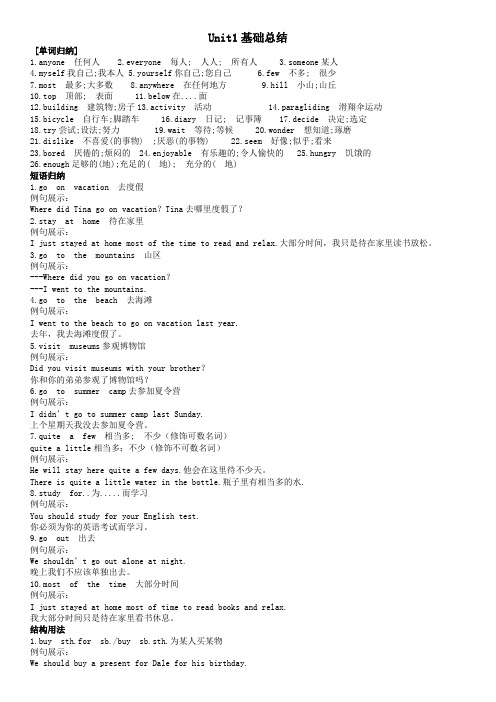
Unit1基础总结[单词归纳]1.anyone 任何人2.everyone 每人; 人人; 所有人3.someone某人4.myself我自己;我本人5.yourself你自己;您自己6.few 不多; 很少7.most 最多;大多数 8.anywhere 在任何地方 9.hill 小山;山丘10.top 顶部; 表面 11.below在....面12.building 建筑物;房子13.activity 活动 14.paragliding 滑翔伞运动15.bicycle 自行车;脚踏车 16.diary 日记; 记事簿 17.decide 决定;选定18.try尝试;设法;努力 19.wait 等待;等候 20.wonder 想知道;琢磨21.dislike 不喜爱(的事物) ;厌恶(的事物) 22.seem 好像;似乎;看来23.bored 厌倦的;烦闷的 24.enjoyable 有乐趣的;令人愉快的 25.hungry 饥饿的26.enough足够的(地);充足的( 地); 充分的( 地)短语归纳1.go on vacation 去度假例句展示:Where did Tina go on vacation?Tina去哪里度假了?2.stay at home 待在家里例句展示:I just stayed at home most of the time to read and relax.大部分时间,我只是待在家里读书放松。
3.go to the mountains 山区例句展示:---Where did you go on vacation?---I went to the mountains.4.go to the beach 去海滩例句展示:I went to the beach to go on vacation last year.去年,我去海滩度假了。
5.visit museums参观博物馆例句展示:Did you visit museums with your brother?你和你的弟弟参观了博物馆吗?6.go to summer camp去参加夏令营例句展示:I didn’t go to summer camp last Sunday.上个星期天我没去参加夏令营。
人教新目标版八年级英语上册Unit1Wheredidyougoonvacation教案 3

Unit1Wheredidyougoonvacation?教学目标:Teachingaims:1.知识与能力目标:1).学会谈论过去发生的事件,巩固学习一般过去时的用法,尤其是一般过去时中对地点的提问及回答。
2).学习掌握有关复合不定代词和地点副词的用法。
3).掌握有关描述性的形容词,并学会运用be+形容词来评价事物。
2.过程与方法目标:通过运用本单元的目标语言,能够正确使用复合不定代词和地点副词,运用描述性形容词描述过去的旅游经历,进一步巩固一般过去时。
3.情感态度与价值观:通过本单元所学内容,学会合理安排自己的假期生活,保留对过去的美好回忆,珍惜现在。
SectionA第一课时(1a-2b)一、课型:新课二、教学重难点:1).巩固复习一般过去时。
2).学习有关复合不定代词和地点副词的用法。
三、教学准备:多媒体,录音机四.教学过程:1.课前预习:预习1a-2b.2.正课教授(1)引入T:Hello,everyone!Howwasyoursummervacation?Ss:...T:Wheredidyougoonvacation?(askonestudenttoanswer)S1:... T:Howwasyourtrip?Whodidyougowith?S1:...Then,studentscanaskeachotherthesamequestionstoknowtheirt rips.(2)语言知识详细讲解1.有关单词、短语:stayathome,gotothemountains,gotoNewYorkCity,gotosummercamp,studyfortests,2.句型:-Wheredidyougoonvacation?-Iwenttothemountains-Didyougowithanyone?-Didyoubuyanythingspecial?3.复合不定代词:①复合不定代词和地点副词的构成:由some,any,no,every分别加上-body,-thing,-one构成的不定代词叫做复合不定代词;加上-where 构成副词。
人教版新目标八年级英语上册课文翻译

八年级上册参考译文Unit1WheredidyougoonvacationSectoinB2b7月15日,星期一1.今天早上我和家人抵达马来西亚槟城;2.天气晴朗炎热,于是我们决定去宾馆附的海滩;3.我和姐姐尝试了滑翔伞运动,我感觉自己就像一只鸟;这太令人兴奋了4.午饭我们吃了非常特殊的东西——马来黄面,可真是好吃呀5.下午,我们骑自行车去了乔治市;6.如今那里有许多新的建筑,但是许多老房子依然还在;7.在乔治市的一处古老的地方——海墘街,我们看到了一百年前中国商人们的房子;8.我在想这里过去的生活是什么样子呢;漫步在乔治市真是很享受;7月16日,星期二9.一天的差异是多么大呀10.我和爸爸决定今天登槟城山;11.我们本想徒步到山顶,但是天下起了小雨,于是我们决定乘坐火车;12.因为人太多,我们等了一个多小时的火车;13.当我们到达山顶的时候,雨下得很大;14.我们没有带雨伞,结果我们被淋得又湿又冷,真实糟透了15.并且因为糟糕的天气,底下的东西我们什么都看不到;16.爸爸没有带足够的钱,所以我们只吃了一碗米饭和鱼;因为我太饿了,饭的味道尝起来还真是不错Unit2Howoftendoyouexercise第五中学的学生们在课余时间做什么17.上个月,我们询问了我们的学生一些有关课余活动的问题;18.我们的问题是有关锻炼、使用网络,以及看电视;以下是所获得的结果;19.我们发现我们的学生中只有百分之十五每天锻炼;百分之四十五的学生一周锻炼四至六次;百分之二十的学生一周只锻炼一至三;还有百分之二十的学生根本就不锻炼20.我们都知道许多学生经常上网,但是让我们惊讶的是,有百分之九十的人每天使用网络,另外百分之十的学生每周至少使用网络三至四次;绝大多数学生上网娱乐,并非为了做功课;21.对我们提出的有关看电视的问题的回答也颇有意思;只有百分之二的学生一周看一直三次电视,百分之十三的人一星期看四至六次电视;另外百分之八十五的人每天都看电视虽然许多学生喜欢观看体育节目,但游戏类节目却是最受欢迎的;22.通过使用网络或观看游戏类节目来放松是件好事,但我们认为最佳的放松方式是通过锻炼;它有益于身心的健康;23.诸如参加体育运动这样的锻炼方式不但有趣,而且当你和朋友、家人一起运动时,你们还可以共度时光;24.请记住:”旧习难改;”所以赶快锻炼起来,不要等到来不及了;Unit3I’mmoreoutgoingthanmysister.25.杰夫.格林:我妈妈告诉我好朋友就像一面镜子;26.我比大多数孩子要安静持重,这便是我喜欢看书而且在班上学习更加努力的原因;27.我的好朋友袁力也不太说话,所以我们喜欢一块学习;28.我比较腼腆,所以我不那么容易交上朋友,但我想朋友就像书籍一样—他们不在多而贵在好;29.黄磊:没有必要什么都一样;我最要好的朋友拉里就与我相当不同,他比我高大而且更加外向;30.我们俩都喜欢运动,但他网球打得更好,所以总赢;31.然而,拉里经常能够帮我激发出自己的所能,所以我的网球也打得越来越好;32.不过,拉里学习远不如我用功;我的成绩总是比他好,也许我应当多帮帮他;33.玛丽.史密斯:我并不十分在乎我的朋友跟我一样或与我不同;34.我最喜欢的名言是“一个真正的朋友是在需要时给你帮助,使你感到;”35.我最好的朋友卡罗尔确实善良,而且颇有意思;事实上,她比我认识的任何一个人都有意思;去年我摔断了胳膊,但她逗我开怀大笑,并让我感觉好起来;36.我们无所不谈,可以分享任何东西;我知道她关心我,因为她随时都能够听我倾诉;Unit4Where’sthebestmovietheater谁是达人37.每个人都有一技之长,但有的人真的是非常有才;38.看别人展示他们的才能总是非常有趣的,所以才艺展示节目越来越受欢迎;39.起初,美国有“美国偶像”和“美国达人秀”这样的节目;现在,世界各地都有类似的节目,比如“中国达人秀”;40.所有的节目都有一个共同点:他们试图找到最好的歌手、最有天赋的舞者、最令人激动的魔术师、最滑稽的演员等等;41.各种各样的人都可以参加这个节目;但谁钢琴谈得最好谁唱歌唱得最优美那有你自己来决定;42.人们看这类节目的时候,通常承担着评判优胜者的角色;而且,获胜者总是能得到丰厚的奖赏;43.然而,并不是每个人都喜欢看这类节目;44.有的人认为表演者的生活是杜撰出来的;比如就有人说自己是家境贫寒的农民,但事实上他们是演员;45.但是如果你不把这些节目太当回事,它们还是有看头的;46.而且有一点比较好,就是它们给人们提供了一条实现自己梦想的道路;Unit5Doyouwanttowatchagameshow47.当人们说起“文化”这个词,我们通常会想到艺术和历史;48.但是在美国文化中有一个非常着名的象征,那就是“卡通片”;49.我们都知道并喜爱那只长着一对又大又圆的耳朵的黑色老鼠——米老鼠;50.80多年前,他第一次出现在卡通片威利号汽船中;这部卡通片1928年11月28日在纽约上映,成为第一部带有配音和音乐的卡通片;51.米老鼠的幕后之人便是沃尔特.迪斯尼;后来他变得非常富有和成功;在20世纪30年代,他制作了87部米老鼠卡通片;52.有些人可能会问:为什么这个卡通动物形象如此受欢迎;53.其中一个主要原因是米老鼠就像一个普通人,但他在面对各种危险时总是想尽一切办法;54.在他早期的影片中,米老鼠没有你们幸运,总是遇到各种问题,比如失去房子或者女朋友——米妮;55.然而,他总是准备好去尽其所能;人们去电影院看这个“小人物”如何获胜;很多人都想成为米老鼠那样的人;56.1978年11月18日,米老鼠成为好莱坞星光大道上拥有一颗星星的一个卡通形象;57.现在的卡通片通常不再像米老鼠那样简单,但大家依然知道并喜爱米老鼠;谁还有一对比米老鼠更着名的耳朵呢Unit6I’mgoingtostudycomputerscience.SectoinB2b58.你知道决心是什么吗决心就是一种承诺;59.很多时候,我们对他人许下承诺;“妈妈,我保证我从学校回来后立即整理自己的房间;”60.然而,你对自己许下的承诺就叫做决心;其中最常见的一种就是新年计划;61.一年的开始常常是制定计划的时候;我们在新年伊始制定计划时,希望我们的生活变得更好;62.有人把他们来年的打算和计划写下来;这能帮助他们记住自己的计划;其他人则把他们的愿望和计划告诉家人和朋友;63.决心有很多种;64.其中一些与身体健康有关;例如,有些人跟自己承诺,他们将开始某种锻炼或少吃快餐;65.很多决心是关于自我提升的;这些决心是为了让自己成为一个更优秀的人;66.人可能会说,他们将开始培养某种兴趣爱好,比如画画、摄影、学弹吉他;67.还有些决心与合理的时间规划相关,比如制定一周学习计划;例如,一个学生可能需要安排更多的时间用来学习;68.尽管决心各种各样,但它们大多数拥有一个共同的特点:那就是人们很少能够遵守它们69.这其中还有很充分的原因;有时是因为决心太难而无法实施,有时人们干脆把它们抛在脑后;70.因此有人就说,没计划就是最好的计划;那你呢来年你会制定计划吗Unit7WillpeoplehaverobotsSectoinB2b71.在观看关于未来的电影时,我们有时会看见机器人;72.通常它们像人类的佣人;它们帮着做家务,或者在肮脏或危险的地方干活;73.现在已经有机器人在工厂里干活了;74.有些机器人能帮我们制造汽车,并且它们反复地干着简单的工作;75.将来做这样的工作的人会更少,因为它们很枯燥,但是机器人永远不会感到厌烦;76.科学家们正在努力使得机器人看上去像人,并且与我们做同样的事情;77.在日本,有些机器人会走路、跳舞;这种机器人看起来很有趣;78.但是,一些科学家认为,尽管我们能够让机器人像人一样活动,却很难让它们像人类那样思考;79.例如,科学家詹姆斯.怀特认为,机器人永远不可能像人一样醒来后知道自己在哪里;80.但是,很多科学家不同意怀特先生的观点;他们认为在25到50年之后,机器人甚至能够像人类那样说话;81.一些科学家相信,未来会有更多的机器人;然而,他们认为这可能需要数百年的时间;82.这些新型的机器人将会有很多不同的形状,有的会看起来像真人,其他的可能看起来像动物;83.比如,在印度,科学家们已经制造出像蛇一样的机器人;如果建筑物倒塌了,并且还有人在里面,这些蛇形机器人能够帮助搜寻埋在建筑物下面的人;84.这在20年前还是不可能的事,不过在100年以前,电脑、火箭看上去似乎也是不可能的;我们永远不知道未来会发生什么事\Unit8HowdoyoumakeabananamilkshakeSectoinB,2b美国的感恩节85.在大多数国家,人们通常在特殊的节日里吃传统食物;86.在美国,感恩节就是这样一个特殊的日子;感恩节总是在每年十一月份的第四个周四,这也是人们感谢秋季所获得的食物的时刻;87.此时,人们也回忆起约400年前从英国迁来美国生活的首批旅行者;88.这些旅行者度过了一个漫长而又艰难的冬季,他们中很多人死去了;89.在接下来的那个秋天,他们为在新的家园能够活下来并且获得了食物而感恩;90.现在,大多数美国人依然通过和家人团聚吃大餐的方式来纪念这种感恩的思想;91.感恩节大餐中的主菜几乎总是火鸡一种大型的禽类;92.做火鸡下面是感恩节大餐中火鸡的一种烹饪方法:93..首先,将一片面包屑、洋葱、盐和胡椒粉混合在一起;94..接着,将上述含有面包屑的混合物放在火鸡肚子里;95..然后,将火鸡放到烤箱中烹制数小时;96..火鸡熟后,把火鸡放到一个大盘子上,浇上肉汁;97..最后,将火鸡切成薄片,就着胡萝卜和土豆之类的蔬菜吃肉;Unit9 CanyoucometomypartySectoinB,2b98.你好,戴维:好主意我真的特别喜欢斯蒂恩小姐;她帮我把英语提高了那么多;99.她要离开我很难过;这个送别会的确是表达“感谢”和说“再见”的最好办法;100.我可以帮忙买些食物和饮料;我还可以把斯蒂恩小姐带到欢送会,至于怎么做我已经有个好办法了啦;101.嗨,戴维,非常感谢你策划这个欢送会我很愿意参加,但是我那天没有时间;102.这个月底我们全家要去武汉看我的叔叔和婶婶;103.不过我很乐意帮忙,为聚会做些准备,比如设计些小游戏;如果需要我帮忙,就告诉我吧;104.亲爱的同学们:我相信你们现在都知道这个消息了,那就是我们最亲爱的老师—斯蒂恩小姐很快就要离开回美国去了;105.她要走我们很难过,因为她实在是一位有趣的老师;为了表达我们将会非常想念她,让我们下周五28号为她举办一个惊喜派对吧;106.你们能来吗如果能来,是否能帮忙做下面的事情呢1)买些食物和饮料;2)策划一些小游戏;3)准备游戏需要的用品胶水、纸、钢笔等......4)将斯蒂恩小姐带到欢送会,但事先不要告诉她,这样她才能感到惊喜; 107.期待你们大家的回复;Unit10Ifyougototheparty,you’llhaveagreattimeSectoinB,2b108.如今的学生经常有很多的烦恼;有时他们的问题与学习有关,有时与朋友有关;109.面对这些问题,他们能做什么呢有人认为最糟糕的是什么也不做;110.来自伦敦的女孩劳拉.米勒就同意这一观点;“生活中的问题和烦恼是正常的,”劳拉说:“但我认为找人倾诉很有帮助;如果我们不找人聊聊,肯定会感觉更糟;”111.有一次劳拉把钱包丢了,好几天心神不安;112.她不敢告诉父母这件事;她甚至每天步行三英里到学校,因为她没钱乘车;113.她一直在想:“如果我告诉父母,他们会生气的114.最后,她告诉了父母这件事,他们非常理解;115.他爸爸说,他自己有时也因为粗心犯错误;116.他们给她买了一个新钱包,还让她再小心些;117.我会永远记得以后与人分享自己的问题;”劳拉说;118.罗伯特.亨特就一些常见问题给学生提供建议;他与劳拉有同感;119.最好不要逃避我们的问题;我们总是应该想办法解决它们;120.他认为第一步是找个信任的人倾诉;这个人不必是像他这样的专家;121.学生们经常会忘记,他们的父母有更多经验,并且总是乐于帮助他们;122.在英语中,我们与人分担一个烦恼就像把麻烦分成两半;123.因此,你只要跟人聊聊这个问题,你就已经解决了问题的一半。
2019八年级英语上册Unit1Wheredidyougoonvacation讲义(新版)人教新目标版

Unit 1 Where did you go on vacation? (讲义) Words and expressionsanyone /'eniwʌn/ pron. 任何人anywhere /'eniweə/ adv. 在任何地方 wonderful /'wʌndə(r)fl/ adj. 精彩的;绝妙的few /fjuː/adj. & pron. 不多;很少quite a few 相当多;不少most /məʊst/ adj., adv. & pron. 最多;大多数something /'sʌmθɪŋ/ pron. 某事;某物nothing /'nʌθɪŋ/ pron. 没有什么;没有一件东西everyone /'evriwʌn/ pron. 每人;人人;所有人of course /kɔː(r)s/ 当然;自然myself /maɪ'self/ pron. 我自己;我本人yourself /jɔː(r)'self/ pron. (pl. yourselves /jɔː(r)'selvz /)你自己;您自己hen /hen/ n. 母鸡pig /pɪɡ/ n. 猪seem /siːm/ v. 好像;似乎;看来bored /bɔː(r)d/ adj. 厌倦的;烦闷的someone /'sʌmwʌn/ pron. 某人diary /'daɪəri/ n. 日记;记事簿activity /æk'tɪvəti/ n. 活动decide /dɪ'saɪd/ v. 决定;选定try /traɪ/ v. & n. 尝试;设法;努力paragliding /'pærəglaɪdɪŋ/ n. 滑翔伞运动feel like 给……的感觉;感受到bird /bɜː(r)d/ n. 鸟bicycle /'baɪsɪkl/ n. 自行车;脚踏车building /'bɪldɪŋ/ n. 建筑物;房子trader /'treɪdə(r)/ n. 商人wonder /'wʌndə(r)/ v. 想知道;琢磨difference /'dɪfrəns/ n. 差别;差异top /tɒp/ n. 顶部;表面wait /weɪt/ v. 等待;等候umbrella /ʌm'brelə/ n. 伞;雨伞wet /wet/ adj. 湿的;潮湿的;下雨的because of 因为below /bɪ'ləʊ/ prep. & adv. 在……下面;到……下面enough /ɪ'nʌf/ adj. & adv. 足够的(地);充足的(地);充分的(地) hungry /'hʌŋgri/ adj. 饥饿的as /æz/adv. 像……一样;如同hill /hɪl/ n. 山丘;小山duck /dʌk/ n. 鸭dislike /dɪs'laɪk/ v. & n. 不喜爱(的事物);厌恶(的事物)Central Park 中央公园(美国纽约) HuangguoshuWaterfall /'wɔːtə(r)fɔːl / 黄果树瀑布(贵州)Hong Kong /ˌhɒŋ'kɒŋ/ 香港(中华人民共和国特别行政区) Malaysia /mə'le ɪʒə / 马来西亚Malaysian /mə'leɪʒn/ adj. 马来西亚的n. 马来西亚人Georgetown /'dʒɔː(r)dʒtaʊn / 乔治市(马来西亚) Weld/weld/ Quay /kiː/ 海墘街Penang /pɪ'næŋ/ Hill 槟城山(马来西亚)Tian’anmen Square /skweə/ 天安门广场the Palace /pæləs/ Museum 故宫博物院Mark /mɑː(r)k/ 马克 (男名)Role-playRick: Hi, Helen. Long time no see.Helen: Hi, Rick. Yes, I was on vacation last month.Rick: Oh, did you go anywhere interesting? Helen: Yes, I wentto Guizhou with my family. Rick: Wow! Did you see HuangguoshuWaterfall?Helen: Yes, I did. It was wonderful! We took quite a few photos there. What about you? Did you do anything special last month?Rick: Not really. I just stayed at home most of the time to read and relax. Grammar FocusWhere did you go on vacation? Did you go out with anyone?Did you buy anything special?How was the food?Did everyone have a good time? I went to New York City.No. No one was here. Everyone was on vacation.Yes, I bought something for my father. No, I bought nothing. Everything tasted really good! Oh, yes. Everything was excellent.Fill in the blanks with words in the box and practice the conversation.Linda: Did you do fun on your vacation, Alice?Alice: Yes, I did. I went to Sanya.Linda: How did you like it?Alice: Well, it was my first time there, so was really interesting.Linda: Did you go with ?Alice: Yes, I did. I went with my sister.anyone, something, anything, everything, nothingLinda: Did you go shopping?Alice: Of course! I bought for my parents, butfor myself.Linda: Why didn’t you buy yourself?Alice: I didn’t really see I liked.ReadingRead Jane’s diary entries about her vacation and answer the questions.Did Jane have a good time on Monday? What about on Tuesday?Monday, July 15th I arrived in Penang in Malaysia this morning with my family. It was sunny and hot, so we decided to go to the beach near our hotel. My sister and I tried paragliding. I felt like I was a bird. It was so exciting! For lunch, we had something very special—Malaysian yellow noodles. They were delicious! In the afternoon, we rode bicycles to Georgetown. There are a lot of new buildings now, but many of the old buildings are still there. In Weld Quay, a really old place in Georgetown, we saw the houses of the Chinese traders from 100 years ago. I wonder what life was like here in the past. I really enjoyed walking around the town.Tuesday, July 16th What a difference a day makes! My father and I decided to go to Penang Hill today. We wanted to walk up to the top, but then it started raining a little so we decided to take the train. We waited over an hour for the train because there were too many people. When we got to the top, it was raining really hard. We didn’t have an umbrella so we were wet and cold. It was terrible! And because of the bad weather, we couldn’t see anything below. My father didn’t bring enough money, so we only had one bowl of rice and some fish. The food tasted great because I was so hungry!Exercises一、词汇填空1.It’s a (精彩的;绝妙的) game show. I like it very much.2.You seem to be (无聊的), don’t you?3.I think keeping (日记) is a good habit.4.The girl (决定) to have another try.5.Look at that (建筑物). It’s so high.6.She (想知道;琢磨) what they are talking about.7.Don’t forget your (雨伞). It’s cloudy outside.8.Can you see anything (在……下面)?9.The parents don’t have _ (足够的) money to afford theirchildren’s education (教育).10.I think the food is very delicious maybe because I am(饥饿的).11.Could you tell me your likes and (不喜爱的事物)?12.Can you tell me the (差别) between the two books?二、单项选择( )13. Come here please. I have for you.A.anythingB. nothingC. everythingD. something( )14. I can’t find my watch, but it must be in this room.A. everywhereB. nowhereC. anywhereD. somewhere( )15. —Do you have to say for yourself?—No, I have to say.A. something; everythingB. nothing; somethingC. everything; anythingD. anything; nothing ()16. —Would you like _ to eat?—Thanks, please.A. somethingB. anythingC. nothingD. everything ()17. Don’t be quiet. can ask questions.A. SomebodyB. NobodyC. AnybodyD. No one( )18. Mr. and Mrs. Smith are going to move .A. interesting somewhereB. somewhere interestingC. interested somewhereD. somewhere interested ( )19. —Excuse me, is there in today’s newspaper?—No, nothing.A. something newB. new somethingC. anything newD. nothing new( )20. Everything ready. We can start now.A. areB. isC. beD. were( )21. Paul and I tennis yesterday. He did much better than I.A. playB. will playC. playedD. are playing( )22. a dolphin show in Blue Water Aquarium last Sunday.A. There hasB. There hadC. There wasD. There were()23. —Why are you late again, Grace?—Sorry, sir. I again.A. went to bed earlyB. slept earlyC. got up lateD. had nothing ()24. —Did you give Tom a phone call?—Yes, I did. But nobody .A. answerB. answeredC. will answerD. answers( )25. You had a basketball game yesterday, ?A. did youB. hadn’t youC. didn’t youD. don’t you( )26. It’s spring now, so we decide to the mountains.A. to goB. goingC. to goingD. go( )27. I didn’t really enjoy going out the crowded streets.A. andB. becauseC. because ofD. but ( )28.—Is everyone here today?—No. Tom is at home he got a bad cold.A. becauseB. whenC. because ofD. so( )29. —Could I borrow your camera?—, but please give it back by Saturday.A. I am sorryB. Of courseC. Certainly notD. No, thanks( )30. The old man has , but he isn’t.A.enough money; enough happyB.money enough; happily enoughC.enough money; happy enoughD.money enough; enough happily三、完成句子31.他阅读大量的书,并且努力进入(enter)一所名牌大学。
八年级英语上册Unit1Wheredidyougoonvacation语法小结素材(新版)人教新目标版
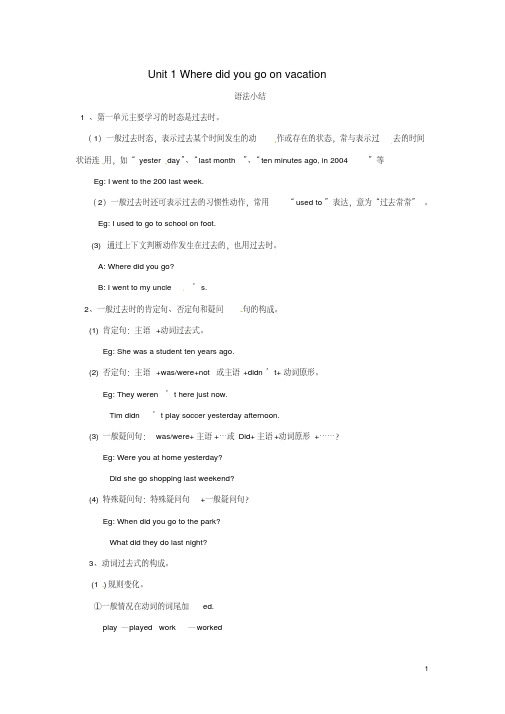
Unit 1 Where did you go on vacation语法小结1、第一单元主要学习的时态是过去时。
(1)一般过去时态,表示过去某个时间发生的动作或存在的状态,常与表示过去的时间状语连用,如“yester day”、“last month”、“ten minutes ago, in 2004”等Eg: I went to the 200 last week.(2)一般过去时还可表示过去的习惯性动作,常用“used to”表达,意为“过去常常”。
Eg: I used to go to school on foot.(3)通过上下文判断动作发生在过去的,也用过去时。
A: Where did you go?B: I went to my uncle’s.2、一般过去时的肯定句、否定句和疑问句的构成。
(1)肯定句:主语+动词过去式。
Eg: She was a student ten years ago.(2)否定句:主语+was/were+not或主语+didn’t+动词原形。
Eg: They weren’t here just now.Tim didn’t play soccer yesterday afternoon.(3)一般疑问句:was/were+主语+…或Did+主语+动词原形+……?Eg: Were you at home yesterday?Did she go shopping last weekend?(4)特殊疑问句:特殊疑问句+一般疑问句?Eg: When did you go to the park?What did they do last night?3、动词过去式的构成。
(1)规则变化。
①一般情况在动词的词尾加ed.play—played work—worked②以不发音字母e结尾的在词尾加 d.like—liked practice—practiced③末尾只有一个辅音字母的重读闭音节词,双写这个辅音字母再加ed.stop—stopped plan—planned④以辅音字母加y结尾的动词变y为i再加ed.study—studied worry—worried(2)不规则变化见教材后面的动词表。
2019秋人教新目标版八年级英语上册中考考纲词汇详解: Unit 1 Where did you go on vacation
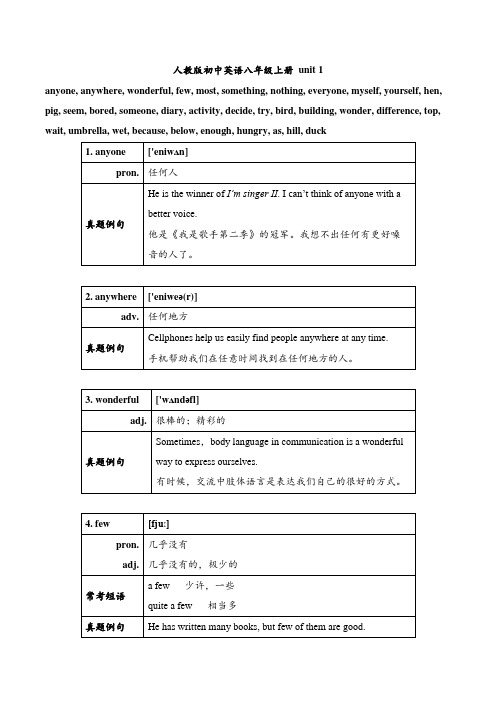
真题例句
Leaving time for activities that are relaxing and fun.
留点时间给那些轻松有趣的活动。
18.decide
[dɪ'saɪd]
v.
决定
词形变化
decision n.决定
常见短语
decide to do决定去做某事
真题例句
She decided to say goodbye to the baby.
有时候,交流中肢体语言是表达我们自己的很好的方式。
4.few
[fjuː]
pron.
adj.
几乎没有
几乎没有的,极少的
常考短语
a few少许,一些
quite a few相当多
真题例句
He has written many books, but few of them are good.
他写了许多书,但几乎没有一本是好书。
5.most
[məʊst]
adj.
adv.
n.
最多的;大多数的
最;最多;极其
大多数
词形变化
原级:many,much;比较级:more
真题例句
Most children like watching TV very much.
大多数孩子非常喜欢看电视。
6.something
['sʌmθɪŋ]
pron.
某事;某物
人教版初中英语八年级上册unit 1
anyone, anywhere, wonderful, few, most, something, nothing, everyone, myself, yourself,hen,pig, seem, bored, someone, diary, activity, decide, try, bird, building, wonder, difference, top, wait, umbrella, wet,because,below, enough, hungry, as, hill, duck
- 1、下载文档前请自行甄别文档内容的完整性,平台不提供额外的编辑、内容补充、找答案等附加服务。
- 2、"仅部分预览"的文档,不可在线预览部分如存在完整性等问题,可反馈申请退款(可完整预览的文档不适用该条件!)。
- 3、如文档侵犯您的权益,请联系客服反馈,我们会尽快为您处理(人工客服工作时间:9:00-18:30)。
2019中考(人新)英语八上U1阅读练习及答案 (限时:30分钟)一、阅读理解AHolidays1. If you’re interested in mountain climbing, you can go to _______.A. the Snowdonia CentreB. the Canary IslandsC. the Young Climbers’ CentreD. the Alpha Resort Tomamu2. At the Snowdonia Centre, the beginners’ costs include _______.A. enjoying the winter sunshineB. walking shoesC. food and roomsD. food and walking shoes3. We can’t enjoy _______ on the Canary Islands?A. Swimming with the sea lions.B. Surfing.C. Watching wild animals.D. Having a sports lesson.4. The Alpha Resort Tomamu is _______.A. a cinemaB. an ice hotelC. a museumD. an ice cream shop5. Tony needs to pay _______ if he wants to visit the Alpha Resort Tomamu with his friend Tom. A. $57 B. $242 C. $114 D. $484【参考答案】1—5 ACDBDB阅读下列短文,从每小题所给的A、B、C、D四个选项中选出最佳选项。
The purpose of students who come to school is to study. But studying needs right ways, or we would waste the time or the money. The followings are ways for studying.The best time for reading is morning. Because in the morning, the air is fresh and our minds are clear. For that reason, we can Set good results.When we study we must be patient. If we don't understand a text well, we must read it again. We should not read the next until we have learned the first one well.When we are studying, we must put our hearts into the book. We cannot read absent -mindedly(心不在焉地), or we could get nothing from the book while we are reading.We must always ask "why". If we can't understand well, write it down and ask our teachers or parents, brothers or friends, in any possible ways. We must know it completely and then our knowledge can be used well.Though there are many ways for studying, however, the above mentioned(提到的) will be helpful if we can keep them in heart.1. Morning is the best time for reading because .A. we can be more patient~B. we can have a good timeC. the air is fresh and our minds are clearD. we can relax ourselves2. When we are studying , .A. we must chat with friends on the phoneB. we'd better Listen to pop musicC. we have to eat somethingD, we should put our hearts into the book3. If we don't understand a text well, .A. we should copy others answersB. we should read it again till understand itC. we don' t do it any moreD. we should give it up and read the next one4. Which of the following is NOT TRUE?A. The purpose of students who come to school is to study.B. When we are studying, we can't be absent - minded.C. We don't have to ask "why" when we can't understand well.D. We should know knowledge completely and use it well.5. The best title of this passage is __________.A. Right Ways of StudyingB. Don ' t Waste TimeC. Be PatientD. Learn to Ask " Why"参考答案1—5、CDBCA二、词汇运用(ⅰ)用方框中所给词语的适当形式填空。
每词限用一次。
expect operate shame take place weak1.It is a(n) to take something else from others without permission.2.The patient spoke , “I can only walk a few steps because of the pain in my foot.”3.The children are to be office workers in China when they grow up.4.After the , my pet dog could walk on its legs again.5.The sad story in a small village in 2009.(ⅱ)[2018·武汉改编]根据短文内容和所给中文提示,在空白处写出单词的正确形式。
每空限填一词。
When you're very, very afraid of something, that fear can affect(影响) you and how you live your life. When I was younger, I saw my 6. (表兄) fall onto an ants' nest. The ants attacked(攻击) him, and he was 7. (覆盖) in terrible bites(咬). After that I became very scared of ants. I wouldn't eat outside, and I didn't even like to play outside.I 8. (检查) my bed for ants every night. But when I turned thirteen, I 9. (决定) I couldn't let my fear get to me. I had to learn to control my fear of ants.First I read a lot about different ants. I didn't focus on bites, but 10. (代替) I read about how helpful ants are to the planet. Ants are really cool! They're hard-working, 11. (群居的), and organized. They help bring air and nutrients(营养) to the earth. They help plants grow, clean up decaying(腐烂的) 12. (事物), andhelp control other insects.Next I began to watch ants from a safe 13. (距离). I started to look at a family of ants in real time on the Internet in order to learn how they live. Little by little, I felt more 14. (舒服的) about ants. Finally I went outside one day and let an ant move onto my hand and 15. (触碰) it gently. It was okay! Now that I know about all the good things ants do, I'm not so afraid of them anymore.参考答案:(ⅰ)1.shame 2.weakly 3.expected 4.operation 5.took place(ⅱ)6.cousin 7.covered 8.checked 9.decided 10.instead11.social 12.matter 13.distance fortable 15.touched三、书面表达你校英语社团正在开展主题为“How do students find study partners?”的讨论,为此你采访了一些学生。
